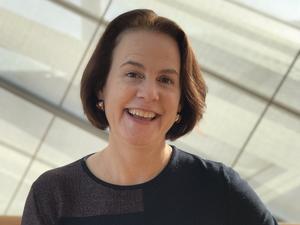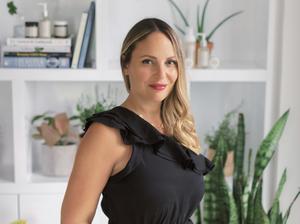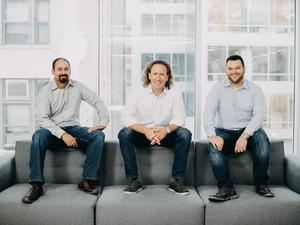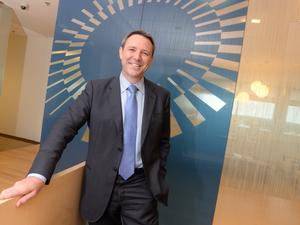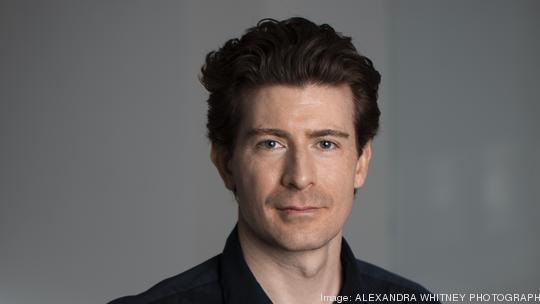
D.C. biotech Otolith Labs is looking to raise millions of dollars in fresh funding to take its medical device for vertigo sufferers through clinical trials and to market — after multiple pivots.
The startup is now looking for a lead investor for its Series A round between $10 million and $15 million, to fund the company’s go-to market roadmap. That involves taking the product through a pivotal study, submitting and earning approval from the Food and Drug Administration, launching a telemedicine sales strategy and marketing the device. If all goes according to plan, the target is to be selling in 2023, said founder and CEO Sam Owen.
The wearable tech — a headband that mitigates the vestibular system, a set of senses in the inner ear that control balance — was originally developed to treat motion sickness. And though it has the potential to help alleviate symptoms associated with multiple balance disorders, the company later opted to focus first on vertigo, a symptom of multiple diseases that includes extreme dizziness.
That shift changed Owen’s initial plan to raise $5 million back in 2018, because it first needed vertigo data for venture capitalists. At that point the company ended up raising a smaller $1.5 million angel round, and obtained another $1.8 million in government contracts. The readjustment also delayed the company's original plan to get an FDA approval in 2019.
“So basically, we decided to sacrifice early revenue for the long-term upside,” Owen said. “Combined with our rookie mistake of trying to use top doctors at universities to conduct our initial trials — large bureaucratic institutions don't move fast — we ended up losing a lot of time starting down a few dead ends and quagmires.”
This year came a different kind of pivot, when Otolith’s clinical trials with universities shut down amid coronavirus, “and we realized our technology was very telemedicine friendly,” Owen said. So he and his team recruited and enrolled vertigo patients online, “and then we just realized we can do this ourselves.”
The company also broadened the focus of its study, now testing patients experiencing vertigo because of a variety of causes, rather than from a specific condition. The pilot study kicked off in June and 31 people have completed it, with 80% showing “significant improvement” in their symptoms, Owen said.
That paves the way for Otolith to sit down with the FDA in January and seek a green light for a pivotal trial in 2021.
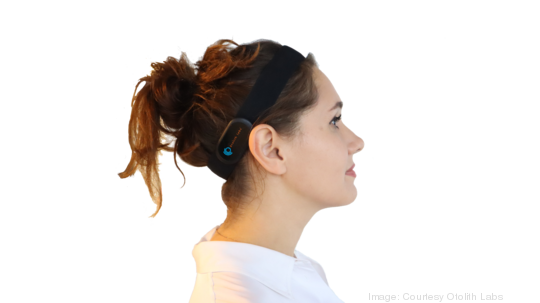
When it is time to take the wearable to market, Owen plans to first use UpScript, an online platform that would connect patients interested in Otolith’s product with licensed clinicians familiar with it, through telemedicine. The platform, from Scottsdale, Arizona-based UpScriptHealth, would also distribute the device nationwide, he said.
That route provides a lower barrier to entry for the business, allowing it to scale faster initially; while the goal is to eventually educate physicians across the country about the technology, “an awareness campaign like that is very expensive and takes a long time to do,” Owen said.
Owen sees the device’s target user as a person with a chronic condition that causes vertigo episodes frequent enough to disrupt daily life; for instance, missing work or even leaving a job. The opportunity is there, he said, with 16 million vertigo cases recorded annually. And though treatment options exist, they’re limited to physical therapy and select drugs that suppress the vestibular system.
Otolith is aiming to have a recurring-revenue model, with both a lower-cost device ($500) and a refillable component ($300 for three months), Owen said, with exact pricing subject to change. It will also shoot to secure reimbursement from insurance providers. And it’s pursuing a breakthrough device designation with the FDA, which would streamline that process with the Centers for Medicare and Medicaid Services, he said.
“We’re trying to stay as focused as possible” with respect to vertigo, Owen said. But that doesn’t mean the device couldn’t work for other symptoms. “Our technology does a great job at preventing virtual reality sickness,” he said, now waiting on a potential grant that would back its the tech’s integration with the U.S. military’s virtual reality computers. Otolith also recently won a NASA competition for its potential to help astronauts avoid motion sickness in space, Owen said.
The company has already piloted its tech in helmets for the U.S. Air Force as a mitigation for motion sickness. If NASA wanted to do something similar, “we would be open to hearing from it,” Owen said. “But we’re not going to pivot what we’re doing in our product pipeline until someone shows up with a big check.”
Otolith Labs, named for the small structures in the inner ear that help perceive movement and gravity, launched in 2015 and remains headquartered in Dupont Circle. The 10-person biotech was born out of the $65,000 Owen invested of his own money in its first two years. Owen also went through D.C.’s Halcyon Incubator program, after starting the business based on research while earning his doctorate in physics at Georgetown University.

